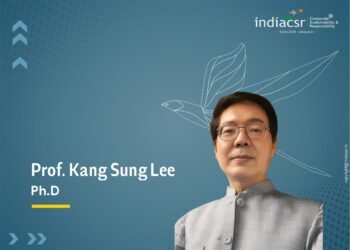Shefali Suri, CHRO, Greaves Cotton shared with India CSR how the company is contributing to society at large. CSR demonstrates a company’s responsibility and commitment to improving communities and society through a variety of environmental and social initiatives. “We believe in creating world-class solutions that help people enhance productivity, propel nations forward, and are sustainable.”, she said. Excerpts of an interview:
Post pandemic, how has CSR evolved to become an important instrument of corporate citizenship?
CSR obliges the enterprise to respect social and ecological factors. Only by being responsible, the corporate entities can contribute to the overall well-being of society and simultaneously grow. While observing the impact of the COVID-19 pandemic, it not only disrupted the socio-economic landscape (across the globe) but also derailed the sustainable development goals. There was a sudden urgency for solving the foundational problems such as poverty, healthcare infrastructure, inequality, the challenges imposed by lockdowns, and alarming environmental conditions. We realized that caring is never an afterthought. It is a commitment that is made always and not just during challenging times. It is second nature, and all initiatives are built on the commitment to organize resources and build expertise with a compassionate and resilient team to support those in need.
As a 163-year-old company, how does Greaves view CSR and what are some of the key initiatives under CSR at Greaves?
Greaves has a strong history of success, relationships, and strong commitments toward its corporate social responsibilities. People’s faith in us has only been possible because of a strong determination toward serving society right with the best intentions, which also contributes to our success. And our efforts have been towards long-term, impactful benefits for people and not with ‘immediate results in mind.
We are constantly striving toward sustaining our goals for inclusive growth, and the betterment of society and the environment. Whether it is the DEEP (Development, Education, Empowerment & Progress) program, PRIME (Program on Real Independence & Mechanic Empowerment), You Care We Care, or Reskilling CSR initiative, the prime goal for us has always been to nurture and contribute to every possible way. These projects, over a period, have been impacting positively and showing tremendous results to people.
The Greaves Scholarship Program (GSP) is an initiative to further the cause of education by financing students’ education. Financially disadvantaged families of auto-rickshaw/e-rickshaw drivers and/or farmers can benefit from this program. Our manner of doing business includes environmental conservation. Greaves Cotton is involved in various environmental efforts, including the Cauvery Calling project with efforts toward tree plantation activity and restoring biodiversity. Through the Rozgaar Program, we also provided livelihood opportunities for the unemployed youth by providing them apt guidance to start with e-rickshaw and earn gainful employment. Initiated START (Supporting Traders to Activate and Reignite Trade), a training workshop where small business owners learn to use and enhance their business outcomes and profits using different resources available under expert guidance.
Throughout the lockdown, we remained committed to standing with the nation and making substantial contributions to society.
Explain the ‘You Care We Care’ corporate social responsibility project and its purpose?
At Greaves Cotton, the well-being of people associated with us is as important as the smooth functioning of our overall business. Under the You Care We Care project launched during the COVID-19 pandemic, we focused on creating awareness of personal hygiene and health protection amongst the auto mechanic community. Mechanics work extensively to keep the mobility alive, it’s our responsibility to treat them back with care and support. Therefore, as part of a thanksgiving gesture, Greaves distributed Personal Sanitization kits to mechanics across various cities. The kit consisted of hand wash and hand gloves, alongside this we spread the awareness of self-care and standard practices of personal hygiene.
Greaves has also given masks to the Karnataka Police in Bengaluru city. This is to keep the ‘Heroes’ safe, who were saving our lives and putting themselves in vulnerable situations. During the COVID-19 crisis, we partnered with CRY to provide dry rations to underprivileged kids & their families for a month across various regions.
With regards to the Reskilling project called – DEEP, what are the current progress and current development?
DEEP (Development, Education, Empowerment & Progress) is a re-skilling program for empowering selected beneficiaries to acquire technical knowledge and workmanship skills that can help them find employment and attain financial independence. This initiative is operated under the Government’s NEEM scheme (National Employability Enhancement Mission) under which socio-economically underprivileged youth are shortlisted, trained, and groomed for enhanced industrial employability. It is a concentrated effort to provide skills to those people who wish to grow but lack financial support.
This CSR project is for young, talented boys and girls (35% of total trainees) from local communities, in and around Greaves’ areas of operations (Aurangabad, Pune in Maharashtra & Ranipet in Tamil Nadu). Through this project, talented students with great potential are identified and employed at our manufacturing facility. These students can then become future growth catalysts for their families and the communities.
With almost half the new trainees being women, this program has touched an untapped section of society, who have traversed from India’s hinterland to create socio-economic independence for themselves as well as their families. With continuous hours of training, these trainees have developed a strong sense of self-worth in them and the program’s behavioral skilling exercise, it has created a stronger emotional quotient.
Over 70% of your workforce in the electric mobility plant at Ranipet are women. How did this happen? Is there a larger purpose to this?
Technical fields have long been known for their lack of gender diversity. Since the dawn of time, the technical, as well as the manufacturing industry, has been dominated by men. Having a diverse workforce in an industry fosters a flow of new ideas, perspectives, and innovation, all of which are critical for the growth of any industry.
Our primary goal has always been to create an inclusive culture and atmosphere for our employees, as well as to encourage women by providing them with equal opportunities to achieve in their areas of expertise. The larger purpose is also to break the stereotype in the automobile industry and with us accounting for 70% of the women workforce, it serves as a reminder and answer to creating change. Women are the backbone of Greaves Electric Mobility, serving as changemakers and true heroes of the country’s EV revolution. These women are the pride of Ranipet, and Greaves is fulfilling their dreams and financially supporting them without letting them leave their hometown.
According to numerous research, the pandemic has impacted the women’s workforce the most. What role do corporates need to play in women’s empowerment and ensure we don’t lose out on women at work?
Over the last few decades, women have made significant strides in the labor force. They work longer hours, pursue higher education in greater numbers, and hold more prominent positions than how it was earlier. Yet it is important to recognize the role that unconscious bias plays in limiting women’s ability to reach their full potential and it is high time organizations across the world realize it.
The pandemic took a great toll on women wherein women were significantly more burned out as compared to men. They have been driving progress and encouraging diversity in a responsible manner but such efforts need to be recognized and rewarded otherwise companies risk losing the very leaders they need right now.
To harness the full force of women, organizations committed to gender diversity will need to continually evaluate themselves on various parameters and reinvent themselves, as needed. Diversity hiring programs, women support groups under the greater diversity umbrella, flexibility, and a variety of other activities will all contribute to increasing the diversity ratio.
It is necessary to secure women’s professional advancement by investing in employee training, mentoring, equality initiatives, education grants, and promotions to senior-level roles. It takes consistent reinforcement to reshape deep-rooted biases and change behavior, hence, a once-and-done approach to training is not effective and companies need to ensure that they are incorporating the new values and learnings from training sessions into everyday processes too. This is crucial for building long-term trust amongst the employees and driving encouragement.
How is Greaves looking at building impact at scale through CSR in the next 4-5 years?
CSR demonstrates a company’s responsibility and commitment to improving communities and society through a variety of environmental and social initiatives. We believe in creating world-class solutions that help people enhance productivity, propel nations forward, and are sustainable. On the back of this ideology, we contribute to society by developing superior, long-lasting technologies and products while remaining responsive to changing societal needs and will continue to do so.
(CopyRight@IndiaCSR)






















